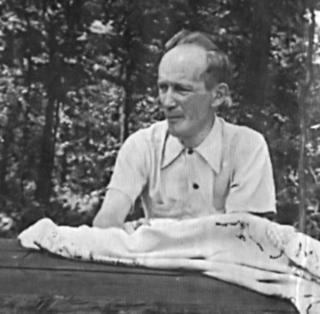
The Berlin Wall was a guarded concrete barrier that encircled West Berlin from 1961 to 1989, separating it from East Berlin and the German Democratic Republic. Construction of the Berlin Wall was commenced by the government of the GDR on 13 August 1961. It included guard towers placed along large concrete walls, accompanied by a wide area that contained anti-vehicle trenches, beds of nails and other defenses. The primary intention for the Wall's construction was to prevent East German citizens from fleeing to the West.

East Berlin was the partially recognised capital of East Germany (GDR) from 1949 to 1990. From 1945, it was the Soviet occupation sector of Berlin. The American, British, and French sectors were known as West Berlin. From 13 August 1961 until 9 November 1989, East Berlin was separated from West Berlin by the Berlin Wall. The Western Allied powers did not recognize East Berlin as the GDR's capital, nor the GDR's authority to govern East Berlin. For most of its administrative existence, East Berlin was officially known as Berlin, capital of the GDR by the GDR government. On 3 October 1990, the day Germany was officially reunified, East and West Berlin formally reunited as the city of Berlin.

Checkpoint Charlie was the best-known Berlin Wall crossing point between East Berlin and West Berlin during the Cold War (1947–1991), as named by the Western Allies.

Günter Schabowski was an East German politician who served as an official of the Socialist Unity Party of Germany, the ruling party during most of the existence of the German Democratic Republic (GDR). Schabowski gained worldwide fame in November 1989 when he improvised a slightly mistaken answer to a press conference question about the future of the Berlin Wall. That raised popular expectations much more rapidly than the government planned and so massive crowds gathered the same night at the Wall, which forced its opening after 28 years. Soon afterward, the entire inner German border was opened.

Roman Osipovich Rosdolsky was a prominent Ukrainian Marxian scholar, historian and political theorist. Rodolsky's book of 1968 entitled Zur Entstehungsgeschichte des Marxschen 'Kapital' : Der Rohentwurf des Kapital 1857–1858, became a foundational text in the rediscovery of Marx critique of political economy, as well as influenced later scholars such as Moishe Postone.
Jeffrey Martin Carney is a former United States Air Force intelligence specialist convicted of spying for East German Ministry for State Security. One of Stasi's most successful spies, code-named "Kid" or "Uwe", Carney became alienated and angry at the U.S. Air Force and U.S. policies under President Ronald Reagan. He began handing over U.S. military documents to the Stasi while working in West Berlin for the U.S. Air Force. After his transfer back to Goodfellow Air Force Base in 1984, Carney decided to once again request permanent asylum in East Germany. His whereabouts remained unknown until 1990 and he was carried on the rolls as a deserter.

Ludwig Renn was a German author. Born a Saxon nobleman, he later became a committed communist and lived in East Berlin.

Franz Fühmann was a German writer who lived and worked in East Germany. He wrote in a variety of formats, including short stories, essays, screenplays and children's books. Influenced by Nazism in his youth, he later embraced socialism.

Bruno Beater was an East German intelligence officer and politician. He served as First Deputy Minister of State Security in the administrations of Walter Ulbricht and Erich Honecker.

Karl Friedrich Köppen was a German teacher and political journalist. He was one of the Young Hegelians.
German individualist philosopher Max Stirner became an important early influence in anarchism. Afterwards Johann Most became an important anarchist propagandist in both Germany and in the United States. In the late 19th century and early 20th century there appeared individualist anarchists influenced by Stirner such as John Henry Mackay, Adolf Brand and Anselm Ruest and Mynona.

Elizabeth Shaw was an Irish artist, illustrator and children's book author, active in Germany.
Hermann Weber was a German historian and political scientist. He has been described as "the man who knew everything about the German Democratic Republic".
Horst Bartel was a German historian and university professor. He was involved in most of the core historiography projects undertaken in the German Democratic Republic (1949–1989). His work on the nineteenth-century German Labour movement places him firmly in the mainstream tradition of Marxist–Leninist historical interpretation.
Brigitte Birnbaum was a German author of books, mainly for children and young people.
Ingeborg Meyer-Rey was a German illustrator. She was one of the best known illustrators of children's books in the German Democratic Republic.

Adolf Hennecke, was an official of the German FDGB and of the Socialist Unity Party of Germany. He gave his name to the Hennecke movement, the German Democratic Republic's Stakhanovite activist movement.

Werner Heiduczek was a German writer. His works have been translated into more than 20 languages and name as author – depending on the language region – Verner Gajduček, Verners Heidučeks or Verneris Heidućekas.
Wolfgang Hütt was a German art historian.
Heinz Gronau was a communist resistance activist during the Hitler years. He was transferred to Buchenwald concentration camp in 1938. At the concentration camp he became a leading figure in the "International Buchenwald Military Organisation" . He survived the war and in 1946 joined the (semi-militarised) police service in the Soviet occupation zone of Germany. A succession of promotions followed. In 1966 he was promoted to the rank of Major general in the East German Felix Dzerzhinsky Guards Regiment. During the final years of his career he combined his overtly military posting with command of the National Department I at the Ministry for State Security ("Stasi"). The department was a specialist intelligence section of the ministry, tasked with attending to the intelligence needs of the ministry's armed units.












